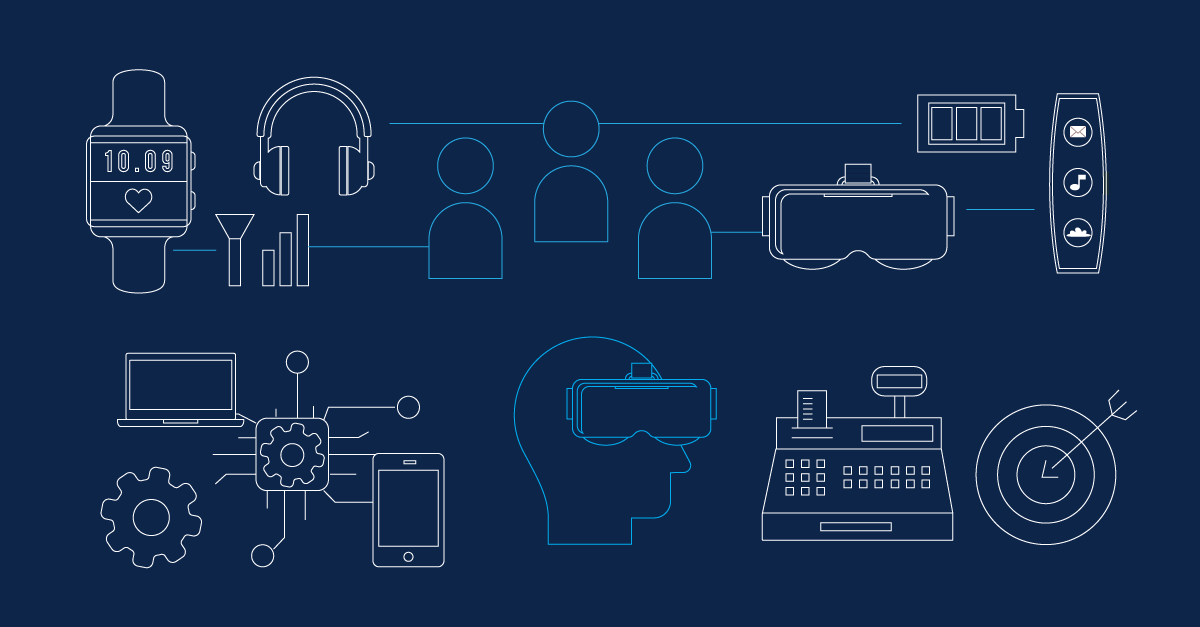What are Business Intelligence Platforms?
Time to read: 6 minutes
Business intelligence (BI) is defined as using data to inform business decisions. These decisions Business intelligence (BI) platforms are a system that helps businesses gather, view, and understand all of their data in one place. The platforms have dashboards, charts, and other tools that allow businesses to quickly see large quantities of data. Most BI platforms are intuitive and easy to use, meaning that users have total control over every aspect of their dashboards. Plus, users can customise these tools to fit their specific business needs. Stakeholders and decision-makers can select the KPIs and visualisations they need the most.
BI platforms integrate with other business tools, such as customer relationship management (CRM) and enterprise resource planning (ERP) software. Salesforce offers a variety of BI products and services with our business intelligence cloud products and Tableau.
See how to unite sales, service, marketing and
deliver success now with Salesforce Customer 360.
Table of Contents
How do business intelligence platforms work?
Business intelligence (BI) helps take the guesswork out of decision-making. It provides a foundation for strategic planning by giving business leaders the information they need to make intelligent, informed business decisions.
Data sources of BI include:
Customer relationship management (CRM) systems
Marketing analytics
Supply chain data
Sales performance dashboards
BI platforms combine these intelligence sources into one location for analysis and reporting. This turns the raw data from across the company into real, relevant, practical business insights.
BI platforms have four main functions that work together to turn raw data into useful understandings:
Gathering data
Companies have a lot of data, sometimes from as many as 1,000 different sources.
BI platforms integrate multiple data sources from databases, data warehouses, and CSV files.
Cleaning data
Understanding data
Visualise data
What are the different types of business intelligence platforms?
There are various options for harnessing business intelligence (BI). Companies need to choose between an in-house system or software as a service (SaaS) business intelligence tool.
SaaS BI platforms work through an internet connection and are hosted in the cloud. Users employ a web browser or app to access the platform. This differs from on-premises business intelligence software, which is usually hosted on physical servers at a company’s facility and accessed via an intranet.
Since SaaS business intelligence software is hosted in the cloud across multiple servers, users can access the platform through any device connected to the internet.
Typically, companies pay a monthly subscription for the SaaS system.
Features vary across products, but some common elements of SaaS systems include:
Platform use | Interactive visualisation |
Platform customisation | |
Data visualisation | Storyboarding |
Geospatial integration | |
Animations | |
Barcode generators | |
Table generators | |
Infographics | |
Filters | |
Widgets | |
Drag-and-drop interface | |
Templates | |
Freehand SQL command | |
Layouts | |
Themes | |
Analytics | Benchmarking |
Predictive analytics | |
Social media analytics | |
Web analytics | |
Geolocation analytics | |
Ad-hoc analytics | |
Trend indicators | |
Profit analysis | |
In-memory analysis | |
Statistical analysis | |
Data mining | |
Machine learning | |
Online analytical processing (OLAP) | Drill-down |
Data exploration | |
Decision services | Various format export |
Financial management | |
Regulatory compliance | |
Monitoring | |
Fraud detection | |
Consulting services | |
Integrations | |
Big data connectors |
There are some substantial benefits to using a cloud-based SaaS platform for business intelligence solutions.
Pros
Flexibility and scalability. Companies can save themselves the difficulties of purchasing, installing, and maintaining in-house software products. SaaS BI tools are available without installation and can be used on-demand.
Pricing. Different subscription models offer the flexibility for businesses to only pay for the services they need. Plus, they can terminate tools when they don’t need them anymore. One of the biggest advantages of a SaaS BI platform is that it comes with a support team responsible for maintenance and keeping it online and accessible.
Less burden. The product provider handles running and maintaining the SaaS platform. That means the business doesn’t need to worry about purchasing additional hardware, servers, or IT staff. Plus, the product provider is responsible for the data security process — saving time, money, and stress.
Easier to start to use. Companies can start a free trial of SaaS BI platforms right away. Tools for business intelligence were a huge investment when they had to be manually installed and run on physical servers. This meant buying a server and paying a team to operate and maintain the system. Hosting business intelligence in the cloud has removed the need for physical equipment and dedicated labourers, resulting in a lower bar of entry. Furthermore, user-friendly interfaces mean users don’t need a technical background to use the tools. Now, even companies with smaller budgets can reap the benefits of BI insights.
Cons
Security and regulations. Using a SaaS BI system will place potentially sensitive data in the hands of a third party. This could breach data security regulations for some industries like finance and healthcare. However, most SaaS system vendors have guarantees around safeguarding data and strict security protocols. This can make these systems as secure as in-house system options. Plus, web security protocols continue to improve.
Unexpected costs. Sometimes SaaS platform vendors are not upfront with their pricing. There may be hidden costs for certain customisation features, extra modules, and live support. Companies may end up overspending if they don’t have an in-depth conversation with vendors about what’s included in the pricing.
Inadequate customisation. While many SaaS BI platforms are flexible, a company’s needs may not mesh with its tools and offerings. Creating a proprietary in-house system tailored to the business’s requirements would prevent this issue. However, this would need to be balanced against the cost of time, money, and resources to get the system up and running.
Inadequate integrations. Depending on the particular platform, it can be difficult to incorporate a business intelligence application from other vendors into a SaaS BI system. You could end up with a fragmented system with patches to achieve the full performance you need.
See how to unite sales, service, marketing and
deliver success now with Salesforce Customer 360.
Why are business intelligence platforms important for business?
Business intelligence (BI) platforms are important because they allow companies to easily and quickly turn data into valuable, practical insights. From there, businesses can find information about market trends and acquire competitive intelligence. They can also compile internal insights, such as pain points for customers, find patterns and similarities between lost opportunities, and identify key stakeholders.
The overall result of using a BI platform is an environment of democratised data. Employees can easily access the data they need to make decisions faster, whenever required. Collaboration, cooperation, and communication between teams are effortless in a culture of data sharing. This gives companies an advantage by improving overall efficiency and quality decision-making.
With a business intelligence strategy, companies can access complete, organised, and accurate data. Business leaders can make better decisions, prevent problems, find potential improvements, and judge the overall health of their organisation. Employees have more time to work on projects and tasks that will boost the company’s performance — instead of creating and reading complex reports.
To sum up, BI platforms are useful because they:
Provide knowledge to make better and faster decisions.
Give greater visibility across the entire organisation.
Make sharing information between teams quick and seamless.
Open a valuable view into market and customer insights.
Provide a descriptive and predictive understanding of data analytics.
Altogether, data gathering is essential for having a competitive advantage in today’s fast-paced, digital world. But raw data is useless without a means to structure or understand it. BI platforms help businesses guide their decisions, predict what may happen in the future, and prepare them to act quickly.
Examples of business intelligence platforms in use
All company departments can benefit from using business intelligence (BI) tools. From sales and marketing to customer support, quick and easy access to data helps with efficiency, collaboration, and decision-making.
A BI platform can help businesses:
Measure business performance metrics against key benchmarks and strategic goals.
Visualise the volume of visitors to a website over a period of time.
Generate reports for strategic decision-making.
Segment and categorise users by their demographic characteristics.
Evaluate marketing campaign performance.
Track customers’ journey through the sales pipeline.
And that’s just the beginning. Here are a few specific examples of how companies can use their business intelligence platform:
Understanding customers
BI platforms help companies create stronger and more accurate customer profiles and personas. Businesses can analyse buying patterns to inform customer segmentation.
With customer segmentation, companies can look at the products people buy, the channels they use, and the frequency of purchases. Marketers can group those customers into distinct yet accurate categories. Then, companies can tailor experiences to those segments with personalised offers and discounts to suit their preferences and needs.
BI tools allow companies to gather customer feedback instantly. With this information, they can create better experiences for their consumers and develop products more suited to their needs.
Increasing operational visibility
Fast and easy access to data allows companies to have a more comprehensive view of their operations. They can find and fix mistakes and inefficiencies quickly. Plus, they have data to predict potential challenges and resolve them before they arise.
For example, a shipping and logistics company can use a BI platform to determine where delays originate. They can use this information to make changes and improve their service.
More robust marketing campaigns
Competitive advantages
Understanding their competitors’ strategies can help companies develop better products and services to outperform their competition. BI platforms can track the competition’s sales and marketing efforts, allowing companies to differentiate themselves.
Plus, companies that can closely monitor their internal processes can adapt quickly to stay in the lead. BI platforms allow companies to perform competitive analysis on large volumes of data. Planning, budgeting, and forecasting help companies keep on top of their internal systems.
Better reporting
Increase revenue
That’s a lot of info!
Here’s what you should take away from this article:
- Business intelligence (BI) is the use of technology to analyse data, giving organisations practical insights to make better business decisions.
- Business intelligence software solutions allow businesses to see all of their data and insights in one place.
- Cloud business intelligence can help companies gain insights quickly through its easy user interface.
- Flexible subscription financing options make BI platforms accessible to both small businesses and large enterprises.
- BI platforms are important for businesses because they can help them gain a better understanding of customers, increase operational visibility and efficiency, inform more robust marketing campaigns, and enjoy advantages over competitors and better reporting
- The overall effect of using BI platforms successfully is an increase in efficiency and revenue.





